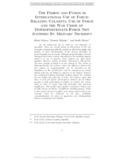The Fission and Fusion in International Use of Force: Relating Unlawful Use of Force and the War Crime of Disproportionate Force Not Justified By Military Necessity

View/
Date
2016Author
Harrison Otieno, Mbori
Wabuke, Emmah
Otieno, Smith
Metadata
Show full item recordAbstract
The cardinal principle governing jus in bello demands a
distinction between combatants and civilians and authorizes the
attack of the former. In essence, loss of civilian life is prohibited
unless it occurs within the context of the principles of necessity and
proportionality. In contrast, the cardinal principle governing jus ad
bellum is that States are not allowed to use force unless done in
individual or collective self-defense. Based on the foregoing, then, two
questions arise. First, can the use of force in wars of aggression be
prosecuted as the war crime of disproportionate force not justified by
military necessity? Second, do the principles of proportionality and
necessity play an extended role where jus ad bellum has been
observed, hence creating a wider justification to an eventuality of loss
of civilian life or negating lawful use of force to unlawful use not
justified by any military necessity?
Prior to the development of modern international law and the
advent of the League of Nations and the United Nations, the legal
rules that governed the use of force by nations were derived solely
from the norms of customary international law. These were norms
that would arise from the convergence of general and consistent State
